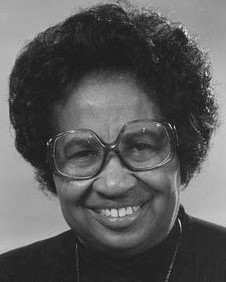Clara Luper - Civil Rights Leader and Educator
Born: May 3, 1923, Oklahoma, U.S.A.
Died: June 8, 2011, Oklahoma City, Oklahoma, U.S.A.
Clara Luper was a courageous teacher and civil rights activist who dedicated her life to ending segregation and empowering young people.
Clara Luper is best known for leading the 1958 Oklahoma City sit-in movement, but her influence went far beyond that single event. As a teacher, activist, and advisor, she became a key figure in the Civil Rights Movement and inspired countless young people to stand up for equality.
Clara Mae Shepard was born on May 3, 1923, in rural Okfuskee County, Oklahoma. Her parents, Ezell Shepard, a World War I veteran and laborer, and Isabell Shepard, a laundress, worked hard to provide for their family. Clara grew up in Hoffman, Oklahoma, where her parents taught her the value of education and perseverance.
Growing up in the Jim Crow South, Clara attended segregated schools and was denied many of the opportunities that white students had. In a 2003 interview, she reflected:“My biggest challenge, I think, was within myself, to believe that I could continue in spite of conditions… And the main challenge and the main satisfaction was knowing that someday we’d be able to do what my father, who was a veteran in World War I, was not able to do, and that was to enjoy the privileges of first-class citizenship.”
Clara never gave up on her education. She attended Langston University, earning a B.A. in mathematics with a minor in history. She then broke barriers at the University of Oklahoma, becoming the first African American student in the graduate history program. In 1951, she completed her master’s degree in history education.
Clara used her education as a tool to fight injustice. She became a history teacher at Dunjee High School in Spencer, Oklahoma, and in 1957 she became the advisor for the Oklahoma City NAACP Youth Council. Inspired by Martin Luther King Jr. and the Montgomery bus boycott, she wrote and staged a play called Brother President, which explained King’s philosophy of nonviolence.
In 1958, Clara brought the Youth Council to New York City to perform the play for the NAACP. Her students saw places where segregation did not exist, which gave them hope and courage. When they returned to Oklahoma, the Youth Council voted to take action in their own city.
Their first protest was a sit-in at Katz Drug Store in downtown Oklahoma City. Clara, her two children, and several students asked to be served at the whites-only counter. They were denied, but the group stayed calm and peaceful. Two days later, Katz management desegregated its lunch counters in three states.
From 1958 to 1964, Clara guided the Youth Council through a campaign of sit-ins, boycotts, and protests to end segregation in Oklahoma City. Together, they integrated hundreds of businesses and public places. Clara also took her students to NAACP national conferences and helped them see that they were part of a larger Civil Rights Movement.
Clara’s activism extended beyond Oklahoma. She attended the 1963 March on Washington, where Dr. King gave his “I Have a Dream” speech, and she joined the Selma-to-Montgomery marches in 1965. On “Bloody Sunday,” she was injured when police attacked peaceful marchers with tear gas and clubs.
Even while leading protests, Clara never stopped teaching. She taught history for 41 years, starting at Dunjee High School and later at John Marshall High School in Oklahoma City, retiring in 1991. Her dedication inspired generations of students; one became the city’s first African American police chief, and another credited her for helping him rise to the rank of U.S. Army Colonel.
Over her lifetime, Clara Luper received hundreds of awards for her work in education and civil rights. She was inducted into the Oklahoma Hall of Fame, the Oklahoma Women’s Hall of Fame, and the Oklahoma Afro-American Hall of Fame. In 2018, the University of Oklahoma renamed its Department of African and African American Studies in her honor. Oklahoma City also named the Clara Luper Corridor, a project linking the state capitol to the historic African American neighborhood, to honor her legacy.
Clara Luper’s life showed that courage, education, and determination can transform a community and inspire a nation.
References:
“Clara’s Story - Clara Luper Legacy Committee.” Clara Luper Legacy, claraluperlegacy.com/clara-s-story.
“Oklahoma Historical Society.” Oklahoma Historical Society, okhistory.org/publications/enc/entry?entry=LU005.
Keywords:
Civil Rights, Justice, Courage, Perseverance, Responsibility, Selflessness, Challenge Injustices,
Stand Up for Your Beliefs
Explore ARTEFFECT projects about this Unsung Hero:
Clara Luper Artworks
- Collections: Art Gallery, Unsung Heroes

